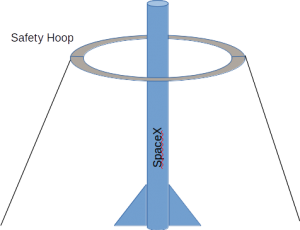How SpaceX Could’ve Easily Avoided the Crash
 The recent SpaceX failure could have been easily avoided by using a cheap simple device they could have figured out in a few minutes by using Predictive Innovation.
The recent SpaceX failure could have been easily avoided by using a cheap simple device they could have figured out in a few minutes by using Predictive Innovation.
The goal of landing the rocket vertically is both to reuse the rocket on Earth but also to develop the ability to land and return from the Moon, Mars, or asteroids to be mined. So they don’t want to only avoid damaging the rocket during landing, they want to build a rocket that is flexible enough to take off, land, and take off again on a wide range of surfaces. A lot can be learned from failures but there is no point destroying the rocket just to learn a little more.
What is the cheap simple solution for SpaceX?
The solution is like a large basket ball hoop over the landing pad. The rocket would land the same way and in the same place but first go through the hoop. The hoop should be large enough to not interfere with positioning and landing but small enough and high enough to catch the rocket if it tipped over. This protects the rocket from smashing on the landing pad and exploding. It would also allow all the data to be collected to learn how to land without the hoop. At the point the rocket falls over the experiment failed so nothing new can be learned. No point in risking damage to the rocket after the lesson is learned.
There is even a similarly cheap & easy way to use this concept for landing on uncharted territory such as Mars. I know that Elon Musk likes using first principles to innovate. The first principles of information is the basis of Predictive Innovation. Elon, give me a call, I also have a patented way to make solar panels for $0.25 / kW and a way to turn eWaste in to precious metals and plant food using 1/10th the energy of other less environmentally friendly systems.
P.S. This offer isn’t exclusive to Elon, unless he calls me first 😉
P.P.S. I can also help your organization with your seemingly impossible problems with a 100% guarantee.
$214 million "Dog ate my homework" handout in new patent law
There are many things wrong with the concept of patents. This handout to a politically connected law firm further demonstrates the error of claiming ownership of an idea.
http://www.nytimes.com/2011/09/08/business/patent-bill-could-save-a-law-firm-millions.html
Patent for faster than light antenna
This patent claims to transmit RF signals faster than light and those RF signals increase the growth of plants. Very interesting if real.
http://www.google.com/patents?id=csYDAAAAEBAJ&printsec=description&zoom=4&output=text
FIELD OF INVENTION
The present invention relates to a new type of antenna for transmission and reception of RF signals. The present invention can be used to replace conventional antennas. It is believed that this invention can transmit energy at a faster speed and over a greater distance than conventional antennas with the same power.
BACKGROUND OF THE INVENTION
All known radio transmissions use known models of time and space dimensions for sending the RF signal.
The present invention has discovered the apparent existence of a new dimension capable of acting as a medium for RE signals. Initial benefits of penetrating this new dimension include sending RF signals faster than the speed of light, extending the effective distance of RF transmitters at 2s the same power radiated, penetrating known RF shielding devices, and accelerating plant growth exposed to the by-product energy of the RF transmissions.
If this actually works it would turn a lot of current technology and economics on it’s head. From a quick read of the patent it sounds rather inexpensive to produce. It was issued in 2000 but 11 years later it still doesn’t seem to be commercialized. That of itself is not surprising. Many inventors fail to develop their world changing inventions simply because they can’t explain the business case to others.



 Predictive Innovation Training
Predictive Innovation Training Predictive Innovation: Core Skills Book
Predictive Innovation: Core Skills Book RoundSquareTriangle.com
RoundSquareTriangle.com